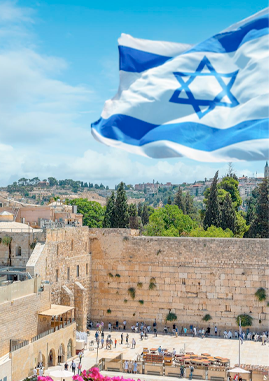
Judea instead of Canaan
It often happens in history that the name of a region changes through the course of time. For example, the “Land of Canaan” had gradually disappeared with the Israelite conquest on the third millennium BC. The Canaanites were in fact a series of ancient city states bearing names such as Megiddo, Hatzor or Layish (later it would become the city of Dan). The ancient Israelites, who were a group of tribes, gradually took over most parts of the land at the expense of the Canaanites. The southern coastal plain was not conquered by the Israelites but by a different group: the Philistines. We’ll get to them later. At any rate most of the land was then called Eretz Israel but was then divided between Israel and Judea: the two ancient semitic kingdoms. Out of the two small kingdoms it was Judea who had lasted. Moreover- the Jewish people were able to maintain their identity both in their land and mostly out of it- when most of the Jewish people were exiled to Babylonia,
And what became of the Philistines?
The Philistines were a small seafaring people, descended from the ancient Mycenaean culture which was the predecessor of the Hellenic culture. They most likely arrived in a few waves of immigration to the land’s shore in the 12th century BC. The source of the name Philistines, so many scholars believe, is from the word root P.L.S, the same root as Polesh, in Hebrew, invader. i.e., this was a sort of derogatory name in Hebrew, for those invaders coming in from the west. We have no idea how the Philistines called themselves, but it’s interesting that some words in the ancient Philistine language have migrated to Hebrew and are used to this day. For example, words such as Kova (hat), Argaz (box) and Seren (captain). The Philistines lived in and around their 5 city states: Ashkelon, Ashdod, Gat, Ekron and Gaza which were ruled by ‘Serens’, a Philistine name for commander or governor. These ancients knew the secret of iron smithery and were able, thanks to this knowledge, to shortly obtain an advantage over their main foe, the Israelites, who were still using bronze weaponry. Thus, the Philistines fought the Israelites a number of times and at the height of their power were able to defeat and kill King Saul and his sons in the Battle of Gilboa. Following this victory, the Philistine rule spread to most of the coastal region and part of the inland regions. Most likely, by that time, the secret of iron smithery had already been revealed to the Israelites and in the time of King David the Israelites had become victorious. Soon enough, the Philistines grew weaker and were pushed back to their five city states. They were able to go on surviving for a few generations but eventually the Babylonians arrived at the region. The Philistines, who at this point have lost their power, were cruelly exiled by Nebuchadnezzar, King of Babylonia as well, a few years prior to the destruction of the First Temple. Archaeologists have also found a number of references to Philistine exiles in Babylonia in the 6th and 5th centuries BC however those references are scant and followed by utter silence. The last of the Philistines were assimilated into the general population in Babylonia and ceased to exist as a historical entity.


Judea as the name of a region ruled by various empires
The name Judea remained the name of the geographic region at the heart of the land, with Jerusalem at its center. This happened because the Babylonians were replaced by the Persian Empire. The Persians were the ones to allow the Jews to return to their land and to their capital city, Jerusalem. And history goes on; the Greeks came and pushed the Persians out and the name Judea prevailed. This time under Greek rule. When the Jews started growing stronger again in the times of the Hasmonaean Wars (The Maccabee Rebellion) the name Judea spread wide along with their conquests until it once more included most of the land. When the mighty Roman Empire came to the region, and took over, the name ‘Judea’ remained the name of the local Roman Province. The Jews had a complicated relationship with Rome. There was tension throughout the land and out of it which finally blew up in a series of rebellions and desperate wars waged by the Jews against the Romans. The Jews also supported, oftentimes, Rome’s great foe from the east, the Persian Empire at its various forms. Rome was too powerful. Every Jewish rebellion was eventually suppressed and cost grave casualties. Thus, the great rebellion was eliminated, and the Temple was destroyed, thus was crushed the harsh diaspora rebellion and thus was suppressed the Bar Kokhba mutiny.
Hadrian’s Curse
This is too short a space to describe the reasons for the Bar Kokhba mutiny. Suffice to say that the Romans took a few blows and defeats by the fanatic rebels. Full of rage and vengeance the Romans did not simply finish with horrible carnage. The emperor Hadrian decided to lay a series of harsh punishments on the Jews. Amongst other things, a pagan city was built on the ruins of Jerusalem (it is possible that this plan was the catalysator for the outbreak of the mutiny to begin with) circumcision was banned, as well as learning Torah in large groups and other harsh edicts. One of those punishments had been to erase the name of Judea (Judea in Latin) off of the map of the Roman world. Hadrian decreed that from now on the province would be named Palestine-Syria, after the ancient Philistines.

Palestine
And history never stops in its tracks. Emperors came and went, the Roman Empire waned in the west but continued to thrive east of the Mediterranean Sea, in its Byzantine incarnation. The Byzantines, like every other empire, were driven off the land and the Muslim Arabs took over. How did the Arabs call this land? The same, they inherited the land and the name Palestine. However, in Arabic the letter P is not pronounced and so they pronounce it with an F, Falestine. Again, this happened because the name of the country was not given by the Arabs in their language, yet, they pronounce a foreign name in their own accent. More rulers came, Abbasids, the Fatimites, crusaders, Ayyubids, Mamluks, Turks and Brits and they all kept the name Palestine. Each with their own accents. However, Hadrian’s punishment still lives on. Did there ever exist, at some point in history, a state named Palestine? No. The land was always a part of some sort of empire. And who was it that kept on devotedly calling it the land Judea or Eretz Israel? The Jewish people of course, who maintained its identity and affinity to its ancient homeland.
Palestinian Identity
Palestinian identity is a modern affair. Somewhere around the 1920s, as a response to the Zionist, Jewish presence in Israel, several Arab scholars began pondering constructing a local nationality. Some called for creating an identity of ‘Southern Syria’ but that didn’t work. Gradually, well into the 1930s, the Arab struggle against the renewed Jewish settlement in the land became more serious and more violent. The great Arab rebellion of the late 30s contributed somewhat to constructing an identity, especially with the anti-British and anti-Jewish sentiments which had spurred. But notice the name of the rebellion. The great Arab rebellion. Not the great Palestinian revolt. That means the rebels’ identity remained mainly a general Arab identity as a common ground. During the harsh war of 1948, as the Arabs of the land and then the Arab countries tried to eliminate the Jewish settlement, the Arabs of the land were struck hard. At no point during the war was there any attempt made by them to unite as a people and fight together. The Arabs of Jericho for instance did not lift a finger as Arab villages were being destroyed in the lowlands and plains. Even the Arab refugees who had fled to Judea and Samaria or to Gaza were given the cold shoulder and were forced to settle in refugee camps and not inside local cities and towns. Why? Because a national identity in the western sense of the word had not been formed yet. It has not been properly formed to this day. The Jews, however, were united and saw themselves as an ancient people fighting for its survival. However, there is no doubt that nowadays, 74 years after that war, most Israeli Arabs identify as Palestinians. It is a nation which is still being formed but it exists and there’s no point in trying to deny its existence, even if it has very short roots. And what of the name? Well, the name Israel/Judea is once more in contest with the name Palestine. How astonishing to think that almost 2000 years after the fact, the punishment given by Hadrian to the Jews lives on. The Palestinian people bear a name they pronounce not in its original form because it’s not an original Arab name. The Palestinian people bear the name given to Judea as punishment.

MAY INTEREST YOU

NOT THE MILK AND HONEY YOU’VE BEEN THINKING OF…
The Bible refers to the land of ancient Canaan as a land of milk and honey. It is indeed the case, but not quite the milk and honey you’ve been thinking of. A Western
READ MORE
HOW EASILY TERRORIST CAN BECOME FAMOUS
Terror means fear. In a world where both mainstream media and social networks can blow up any story in mere minutes, it’s fairly simple to terrify millions of people. In fact,
READ MORE
I FEAR MEARSHEIMER WAS RIGHT.
In 2005 I was a young student on an introduction to internal relations course. The first theory we studied was political realism. It was well formulated by John
READ MORE